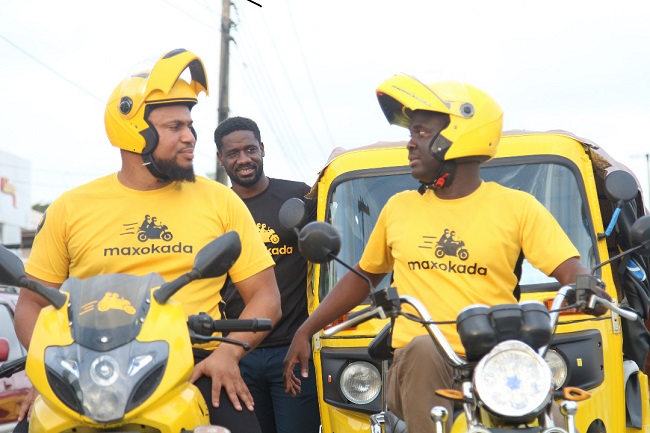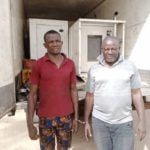Motorbikes are a common feature of many Nigerian cities. Now imagine a city with several motorbikes on the road, but this time they are moving about silently without their characteristic roaring sounds. Not only is there no noise, but there is also no smoke coming out of them that will pollute the environment and harm human health.
Co-founders of Metro Africa Xpress (MAX), Chinedu Azodoh and Tayo Bamiduro, believe such cities, not only in Nigeria but across Africa, will soon be a reality with the take-off of MAX’s assembly plant for motorcycles and tricycles in Ibadan, Oyo State. At its initial stage, the plant will assemble regular motorbikes and tricycles. However, the company has succeeded in creating MAXe, a motorbike retrofitted from an internal combustion engine to an all-electric engine. This electric vehicle and other types will be assembled at the Ibadan plant.
Azodoh said, “With advanced research and development, we have designed bespoke electric vehicles that are waterproof with increased speed, range, comfort, durability and with battery swap technology designed for Nigeria and the Africa terrain. That took us about two and a half years to achieve and now we are proud and excited about what’s coming – an advanced, state of the art version of our electric motorcycles designed for both private and commercial use in sub-Saharan Africa.”
Transportation and the pollution problem
In 2012, a World Health Organisation (WHO) report recorded that 3.7 million people died prematurely because of air pollution.
Emissions from combustion engine vehicles – cars, motorbikes, buses and trucks – are the main sources of greenhouse gases (GHGs) that cause air pollution.
The International Energy Agency (IEA) in 2020 reported that transportation is still responsible for 24% of direct CO2 emissions from fuel combustion. Road vehicles – cars, trucks, buses and two- and three-wheelers – account for nearly three-quarters of transport CO2 emissions.
For the transport sector to meet projected mobility and freight demand while reversing CO2 emissions growth, energy efficiency measures will need to be deployed to maximum effect. One of the energy efficiency measures IEA recommends is “deploying energy-efficient technologies for vehicles and the fuels that drive them,” such as electrification that “enables the use of motors that are far more efficient than internal combustion engines.”
CO2 emission is part of the greenhouse gases that contribute to climate change.
Pollution from fuel-based transport
Africa is urbanising faster than the rest of the world. According to the World Economic Forum, Africa is urbanising at 4 per cent yearly compared to the global average of 2 per cent. In Africa’s development transportation is a growing need. Pollution from fuel-based transport is also a major contributor to growing air quality concerns in African cities, according to a Brookings report.
In response to this challenge, the founders of MAX say that, “We are trying to fix the problem of transportation and logistics in Nigeria and pretty much the rest of Africa by powering Africa’s forward movement and part of doing that requires a shift from gas engines to electric motorcycles. So essentially, what we’ve done is, we’ve looked at the environment, we’ve looked at the problems with transportation and mobility, we’ve also looked at the wider global issues.
“Climate change is a big issue and as a country, we have to take responsibility and say how can we mitigate the impact of greenhouse gas emissions, how can we reduce carbon emissions and how can we become more efficient in terms of how we use energy?
“Having built the first locally engineered electric motorcycle in Nigeria called the MAXe-series M1 with an advanced version called the MAXe-series M2 also released, we are pioneering that transition from petrol-diesel engines to electric-powered mobility and the next version of the MAXe-series is even way more exciting.”
Indeed, there is a demand for electric vehicles (EVs), according to Bamiduro. “One is the energy demand and the other is the transport demand. On the one hand, is the energy demand where we provide sustainable energy demand to mini-grid developers and on the other hand is the transport demand, where we are providing affordable and clean energy to Nigerians for mobility,” he said.
How will EVs work where electricity supply is a problem?
There is no doubt about it – Nigeria has a power supply that has refused to go away. How will electric vehicles work in such an environment?
Bamiduro answers the question: “So the comment I get all the time, more like the elephant in the room is, ‘there is no electricity in Nigeria’ or that ‘electric power supply is epileptic’. But there actually is electricity in Nigeria. It depends on where you look and who you are talking to. So without going into the complexities of our power systems, the reality is that there actually is electricity in Nigeria if you know where to look for it and most importantly, if you have the right partners onboard. They will provide you guaranteed, uninterrupted electricity supply for your application wherever and whenever you need it. A number of our EVs have been deployed within our network and across our cities of operations in Nigeria for taxi services and logistics and we are scaling that up.”
For Chinedu Azodoh, he said, “We see opportunities in problems and this is the case with the electricity supply problem in Nigeria. We are the first company to commercially roll out electric mobility on the continent even in the face of these problems. We’ve done this in a community called Gbamu Gbamu in Ogun state where we have fully solar-powered electric motorcycles and we have a couple more we’d be rolling out. Those motorcycles by the way are locally made in Nigeria. We made them ourselves. Essentially, where we see this going is, we continue to scale our capacity to both organize and formalize transportation by providing the technology to do that.”
Cost of ownership
MAX co-founder, Bamiduro, responds to the question of durability and cost of ownership of EVs in Nigeria saying, “So if you think about your car or your gas engine, there are so many components in it, You’ve got the gasket, the spark plug and so many other parts. For the electric vehicle, it’s just three main parts – the motor, the controller, the battery and of course, the chassis. So you don’t have all those super complicated parts of an internal combustion engine and so it’s a very simple technology because it is more efficient, it is cleaner for the environment and the cost of maintenance is also much lower.and as long as you maintain the battery properly, you can continue to use it for as long as five, six, seven years such that when you change the battery, the electric vehicle is all new again. What we’ve done is essentially build a sophisticated battery maintenance system that allows for ultra-fast battery swap technology and maintenance at our charging stations.
Room for more
It is likely that once the conditions are right, there will be more players in the local electric vehicles industry. Already, the Hyundai Kona electric vehicle has been launched in Nigeria. How does an indigenous company like MAX respond to the possible influx of electric vehicles from outside the country? The founders of MAX say, “So for us the overall picture is, how are we aggressively leading and driving the transition from petrol-powered mobility to electric-powered mobility. Of course, we are very much excited in having other players join us in creating a vibrant electric mobility ecosystem because to deliver the kind of impact that we want to see in Africa, we would be happy to have other players and partners join this transition.
“What I’d say is that we have to keep pushing, we have to own the challenges of the industry, we have to own the challenges of the nation at large and it’s up to us to actually move our electric mobility industry forward. The government is busy with a lot of problems; we should also take on that responsibility to drive the industry forward. To be innovative, to provide policy advice and policy guidance and also build the technology that makes life easier for Nigerians and makes it easier for them to commute in a safe, reliable, affordable and sustainable way.”
Looking at the prospects of an expanded use of electric vehicles in Nigeria, Bamiduro, who is also the CEO of MAX, notes this: “If you look around, there will always be a demand-stimulation opportunity in Nigeria. Nigerians pay a premium for dirty energy, sustainable productive use is a critical investment driver and electric-powered mobility is a leading productive use application that will significantly improve the economic and social lives of Nigerians. So, the opportunities are enormous and what we’ve done is provide Nigerians with access to safe, sustainable, affordable and clean-energy mobility and the demand for this has been overwhelming. Take the impact from up to 12 million combustion engine motorcycles in Nigeria for example, this presents a huge challenge alongside the safety and pollution issues and we are actively plugging this gap.”
Partnerships
In terms of partnership, the leaders of MAX say that there has been so much interest in electric vehicle technology, from governments to energy companies, foreign investors, international development agencies, mini-grid developers and communities.
Azodoh said, “We’ve had some conversations with some state governments, we’ve also had conversations with some of the national utilities that will essentially be providing electricity supply to where we will be launching our charging stations, we’ve got Shell Foundation which is a UK-based energy organization that invests in renewable energy, we’ve got Breakthrough Energy Ventures and a bunch of other partners that we are talking to right now to help us drive our impact at a much higher scale. We are talking to DFIs and we have a couple of governments we are talking to and will be talking to even at the federal level as well to see how they can join us on this journey.
“We are excited about the future of our electric vehicle innovation as we power the future of mobility in Africa.”
YOU SHOULD NOT MISS THESE HEADLINES FROM NIGERIAN TRIBUNE
Former President of Nigeria, Dr Goodluck Ebele Jonathan, has opined that Nigeria is where it is today because of leadership of family and friends, acquaintances rather than ability and capability to deliver.
I Slept With My 12-Yr-Old Daughter Because My Wife Is No Longer Attractive To Me, Man Tells Police
A 49-year-old man, Ubong Akpan, is now in net of the Ogun State Police Command for allegedly having carnal knowledge of his 12-year-old daughter.
Cryptocurrency: Understanding The Craze, Threat
ON Friday, February 6, the Central Bank of Nigeria (CBN) rocked the boat with a circular that inadvertently highlighted how popular cryptocurrency transactions have become among Nigerians in recent years, judging by…
After Two Years, Daddy Freeze Apologises To Bishop Oyedepo
Daddy Freeze whose real name is Ifedayo Olarinde has apologised to Bishop Oyedepo who is the presiding bishop and founder of Living Faith Church aka Winners Chapel…
WATCH TOP VIDEOS FROM NIGERIAN TRIBUNE TV
- Relationship Hangout: Public vs Private Proposals – Which Truly Wins in Love?
- “No” Is a Complete Sentence: Why You Should Stop Feeling Guilty
- Relationship Hangout: Friendship Talk 2025 – How to Be a Good Friend & Big Questions on Friendship
- Police Overpower Armed Robbers in Ibadan After Fierce Struggle






